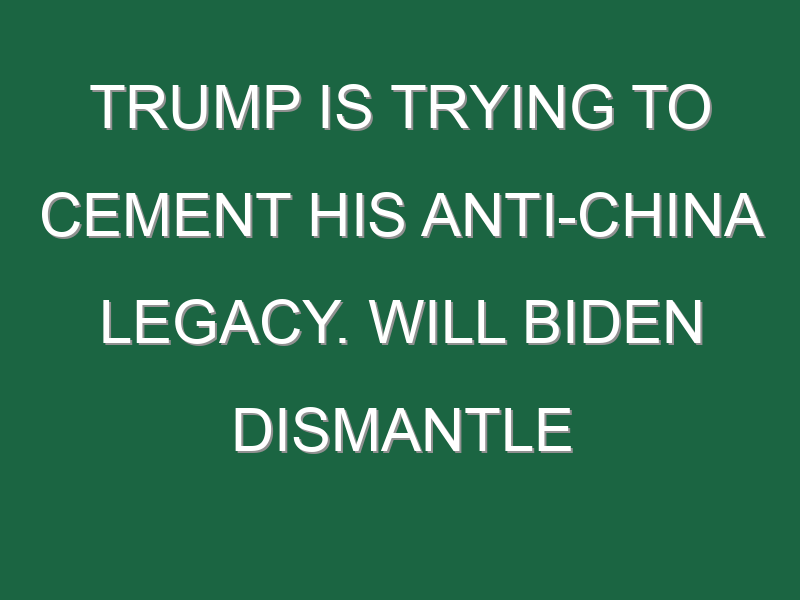This is the web version of Eastworld, Fortune’s newsletter focused on business and technology in Asia. Subscribe here to get future editions in your inbox.
Well, it has been an eventful week in Washington. And yet, amid the chaos, President Donald Trump on Tuesday found time to sign an executive order banning transactions with eight more Chinese apps, including Alipay, the payment platform owned by Chinese billionaire Jack Ma’s Ant Group, and three apps owned by Chinese tech giant Tencent Holdings.
The order is the latest volley in the outgoing administration’s ongoing campaign to use national security powers to counter Chinese technology companies. It alleges the apps “permit China to track the locations of Federal employees and contractors, and build dossiers of personal information.”
The measure won’t take effect for 45 days, a month after Trump’s last day in office. As Bloomberg points out, “it will be up to President-elect Joe Biden to decide whether to enforce the policy.”
Tuesday’s edict—which follows similar bans slapped last August on Chinese social media apps TikTok and WeChat, and a host of technology blacklists aimed Chinese tech giants like Huawei Technologies—won’t inflict significant pain on the companies it singles out because none of them has significant exposure to the U.S. market.
But the measure could create big headaches for American businesses by restricting their transactions in China.
Alipay, for example, was downloaded only about 200,000 times in the U.S. last year, according to Sensor Tower, but claims more than 1 billion users and 80 million merchants in China. Many global companies say it will be impossible for them to do business in China if they are prohibited from AliPay and its main rival, Tencent’s WeChatPay.
But never mind. The order’s main aim, as Reuters notes, is to “cement Trump’s tough-on-China legacy” in his final days in power.
That legacy, deserved or not, is sure to complicate Biden administration efforts to reset the U.S.-China relationship. Biden’s aides have said the new president won’t make any immediate changes to Trump’s China policies, and will proceed deliberately in deciding which to keep, modify, or discard.
As we’ve noted often in this space, hostility towards China is one of the few—if not the only—truly bipartisan sentiments in Washington. Biden will find it difficult to unwind Trump’s sanctions and renegotiate his “phase one” trade deal without antagonizing Democratic friends and Republican foes alike.
Biden does promise, though, that he’ll work together with other Western democracies to bolster U.S. leverage in dealing with China. That would be a departure from Trump’s “go-it-alone” approach. Central to that shift is a proposal to create a “Summit of Democracies” to articulate an alternative to Chinese authoritarianism. But as Bob Davis and Lingling Wei point out in this thoughtful analysis in Wednesday’s Wall Street Journal, building a “grand alliance” to counter China poses daunting challenges.
“Given the lure of the vast Chinese market,” they write, “Mr. Biden could face a tough time convincing allies to sign up for a united front against Beijing…U.S. allies say they can’t be sure of America’s long-term commitment to an international alliance, given four years of a unilateral approach.”
Case in point: China and the European Union last week agreed on a sweeping investment treaty designed to create lucrative new business opportunities for both sides, concluding seven years of tortured negotiations. EU leaders signed off on the deal despite heated internal debates about China’s record on human rights and forced labor, and a last-minute appeal from Biden’s national security adviser Jake Sullivan to hold off until they’d had a chance to discuss it with the new administration.
The EU-China deal remained intact despite the arrest in Hong Kong on Wednesday of 53 pro-democracy activists on national security charges. The EU is still keen to get the deal done, Bernd Lange, head of the EU parliament’s trade committee, told the South China Morning Post.
Financial Times columnist Gideon Rachman decried the investment treaty as “a considerable kick in the teeth for Joe Biden.”
Europeans are “kidding themselves if they think they can be blind to the increasingly aggressive nature of Xi Jinping’s China,” Rachman argued. “If an authoritarian nation, such as China, displaces America as the dominant global power, then democracies all over the world will feel the consequences.”
More Eastworld news below.
Clay Chandler
[email protected]
This edition of Eastworld was curated and produced by Grady McGregor. Reach him at [email protected].



